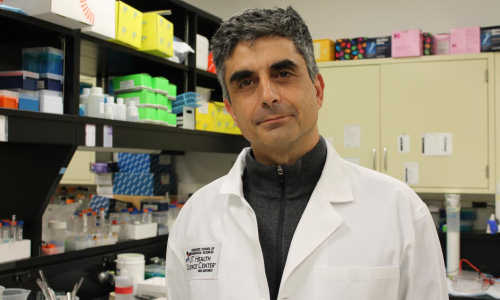A biochemist from The University of Texas Health Science Center at San Antonio is a co-author on a paper in Nature that describes a new, more efficient method of making ribonucleic acids (RNAs).
Rui Sousa, Ph.D., professor of biochemistry in the School of Medicine at The University of Texas Health Science Center at San Antonio, is co-author of a paper in Nature that describes a method to make chemically diverse ribonucleic acids (RNAs). Photo Credit: The University of Texas Health Science Center at San Antonio
RNAs are molecules that can be used to make therapeutics, sensors and diagnostics, for which there is a growing market, said Rui Sousa, Ph.D., professor of biochemistry in the School of Medicine at the Health Science Center. He is a co-author on the paper with colleagues from the National Institutes of Health, the University of Colorado and Leidos Biomedical Research Inc. in Frederick, Md.
“This new technique allows a researcher to make RNA molecules that are chemically diverse,” Dr. Sousa said. “This is desirable for studies of RNA structure and function, and for design of applications that could be used to diagnose and treat disease.”
Deoxyribonucleic acid (DNA), a double-stranded molecule, is the genetic blueprint contained in all cells. The genetic information of DNA is copied into molecules called messenger RNAs, which are basically the manufacturing instructions for proteins. Different types of RNAs perform different functions, such as silencing a gene or regulating a plethora of processes in cells.
Until now, researchers’ ability to fine-tune RNAs to develop diagnostics and therapeutics has been limited by existing technology. The new method described by Dr. Sousa and his colleagues in Nature, which includes robotics, will speed up research exponentially, he said.
Story Source:
The above story is based on materials provided by The University of Texas Health Science Center at San Antonio.





